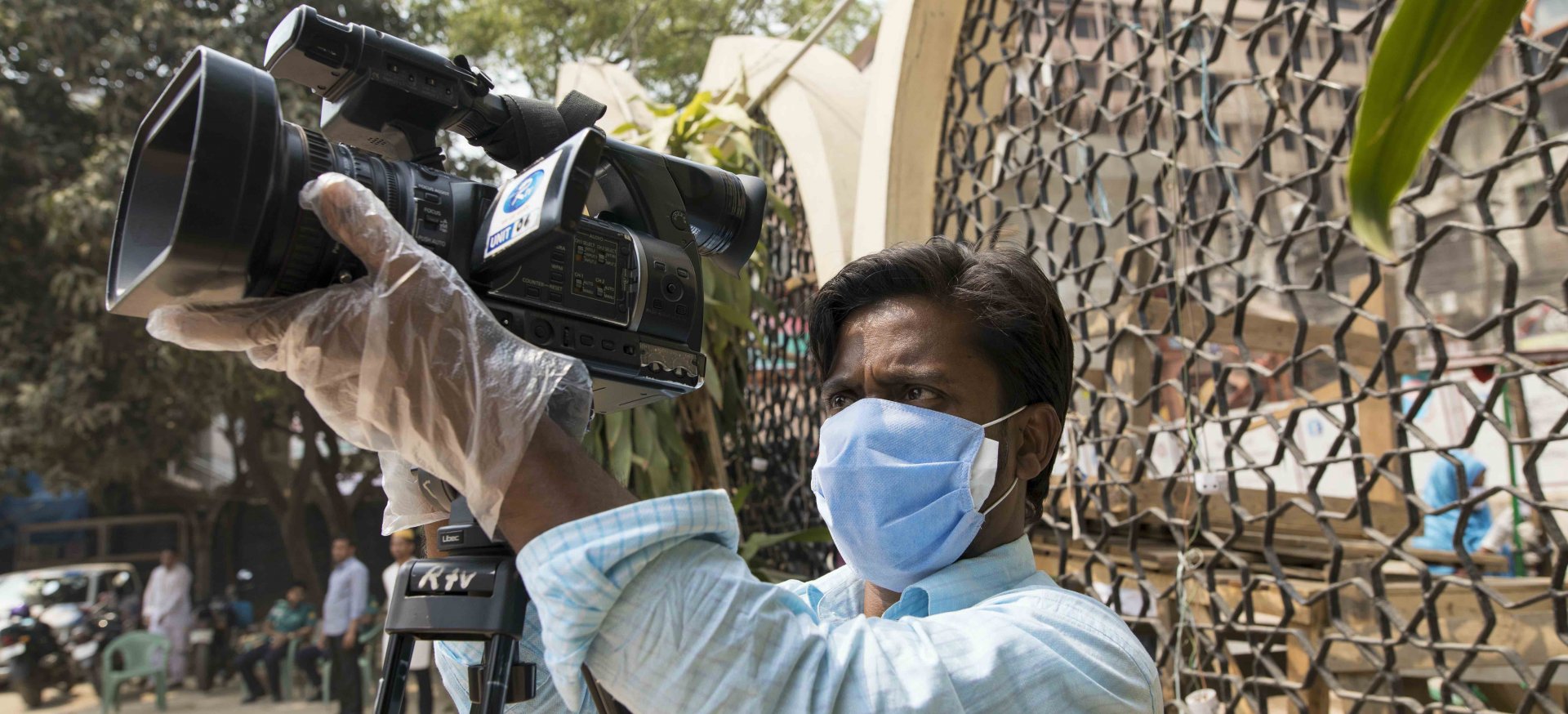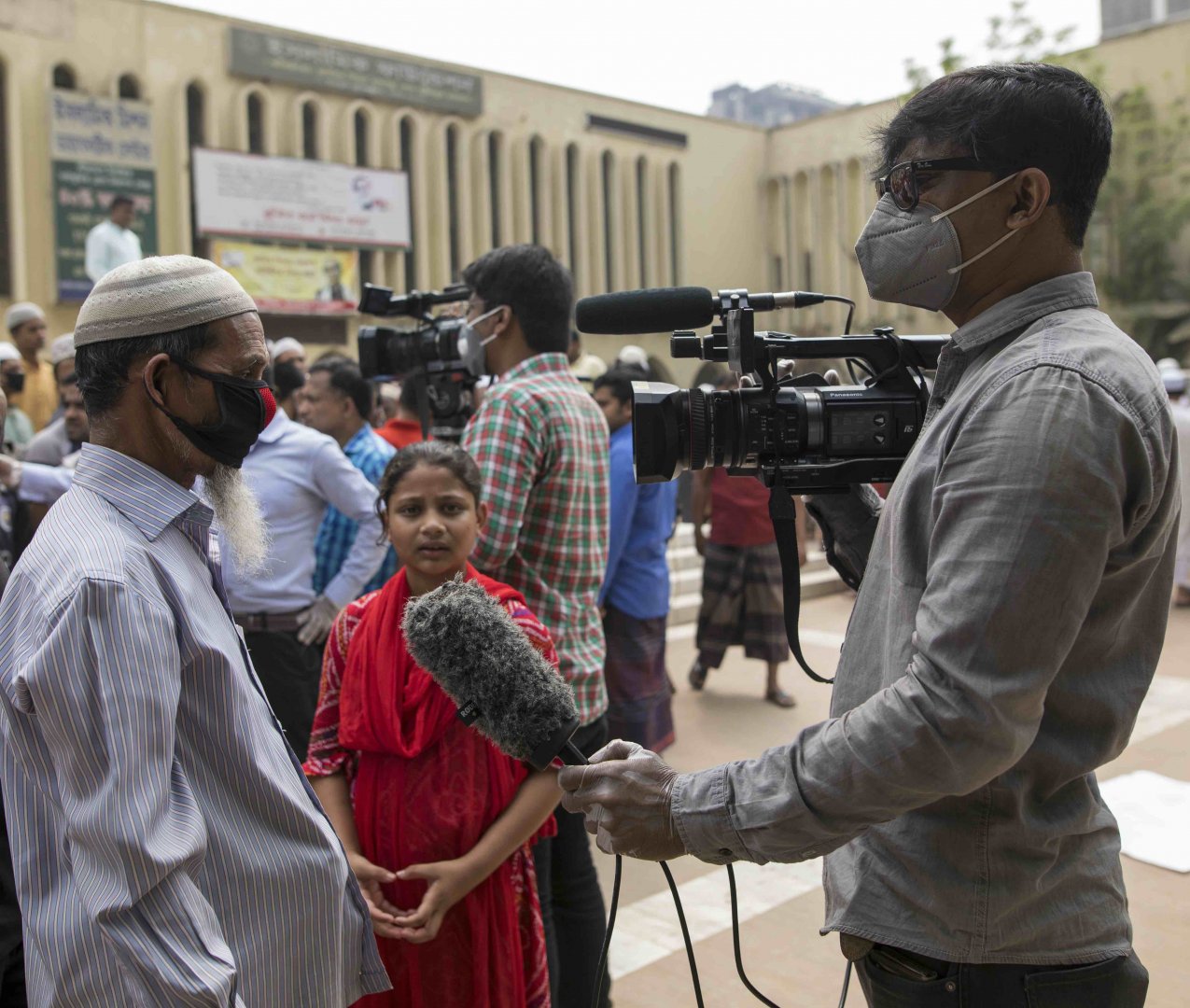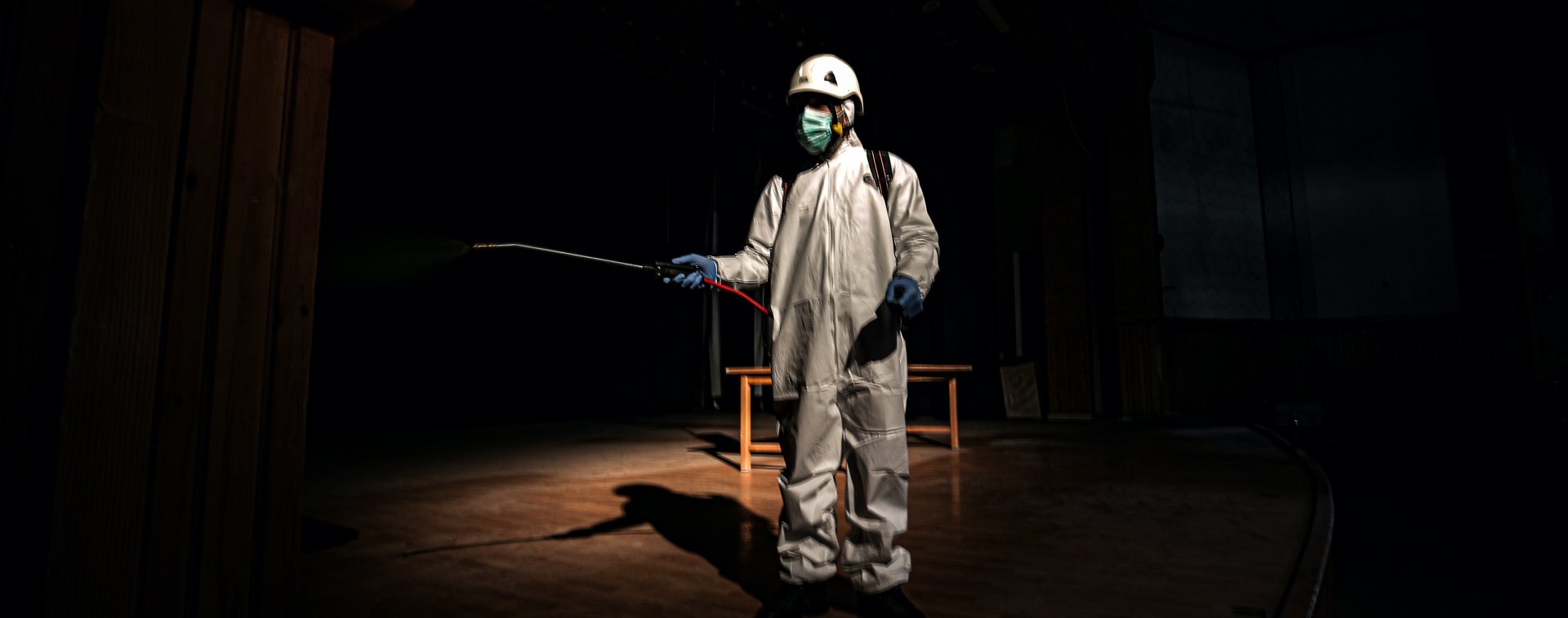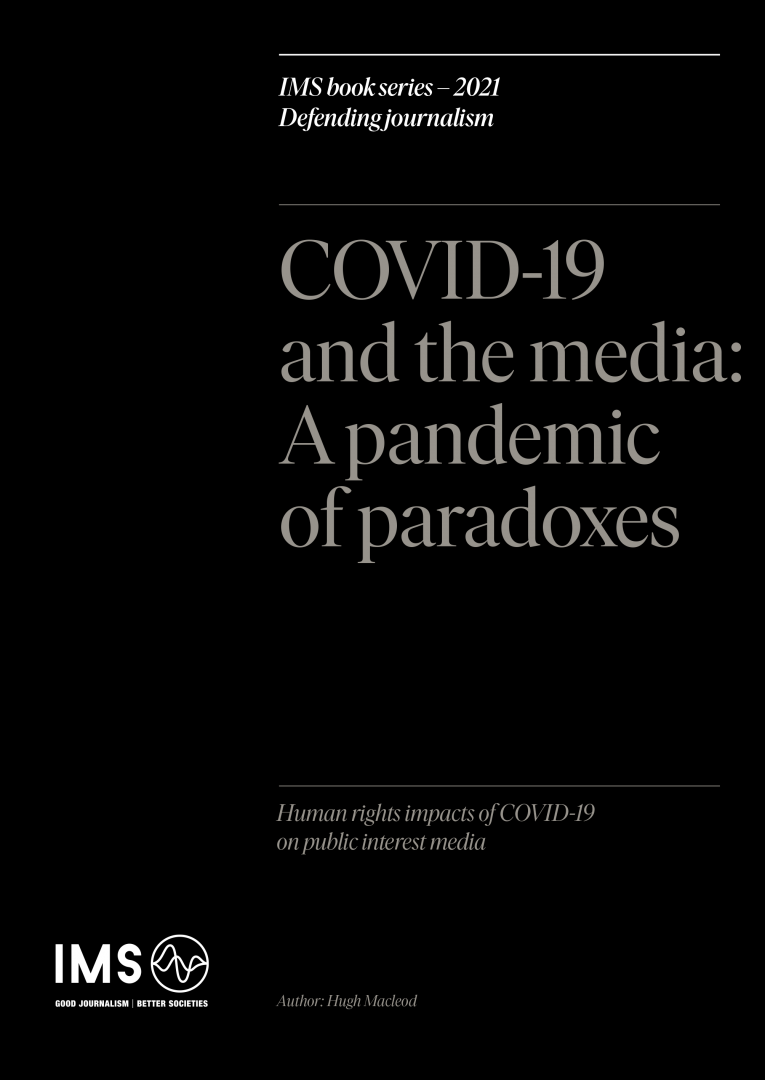
Journalist wear mask and gloves during assignment amid corona virus epidemic in Dhaka, Bangladesh on Thursday , Mar. 26, 2020. (Photo by Syed Mahamudur Rahman/NurPhoto via Getty Images)
The paradox facing media: record audiences, shrinking revenues
The crisis caused by the novel coronavirus has shaken the media business worldwide. Independent media are working hard to utilise new opportunities, but at the same time, new challenges may prove to be insurmountable.
Media are seeing growing audiences
How do you break bad news to someone? Do you ask if they want the good news or the bad news first? And what if the good news actually shines some light in otherwise dark circumstances?
The novel coronavirus is causing that exact dilemma when it comes to describing the situation many independent media outlets are currently facing. As part of IMS’ coronavirus response, we reached out to our partners around the world to collect their experiences and get their view on the matter – and yes, let’s start with the good news, since bad news has been given the lion’s share of our attention the last few months.
The most obvious positive development in the wake of the coronavirus crisis is an instant increase in readership. Partners from across the Middle East, Africa and Asia report of Covid-19 related audience growth. This is part of a global trend where citizens on a massive scale have sought out credible information about the novel coronavirus. As pointed out by The Fix, factcheck media, independent media and community media are seemingly witnessing the biggest online traffic increase compared to other types of media – a tendency confirmed by IMS’ partners, where many have seen double-digit and even triple-digit percentage increases in their audience reach. Additionally, the very direct demand for information that the increase is a reflection of has also led to an increased sense of purpose, as Alia Ibrahim from Daraj in Lebanon explained earlier.


Finding new formats to satisfy a growing demand
One of IMS’ partners who has seen their audience more than double as a consequence of the coronavirus is PumaPodcast from The Phillippines. Part of their strategy has been to let the news agencies run with the breaking news stories and instead focus on the personal stories that better unpack the human side of the pandemic. As part of that, PumaPodcast has introduced a new diary format of shorter podcasts that has caught on with listeners, which, in a broader sense, constitutes another opportunity that the coronavirus has brought with it: innovation.
Developing new formats and innovative ways of doing journalism is definitely part of the independent media response to the current crisis where many journalists, sources and much of the audience are trapped at home.
“We have had to adjust our work process, and we have had to innovate and to practice new ways of producing while telecommuting. Interviews with resource persons have had to take a hit quality-wise, but this has been an opportunity to teach these same experts and resource persons to raise their comfort levels with granting interviews online,” says Carl Javier, COO at PumaPodcast.
One of IMS’ Jordanian partners, 7iber, has made use of a similar approach of finding a hole in the market and use that as an opportunity to reach and inform a larger audience during this crisis:
“7iber’s coverage has been filling a gap as state-sponsored media’s and mainstream media’s coverage of Covid-19 – though extensive – is almost completely driven by government officials’ statements and virus spread and containment news. In light of this, 7iber is paying attention to what is happening behind the scenes, away from the eyes of the public and the government, of social and economic ramifications taking hold on vulnerable people across the country,” says Lina Ejeilat, executive editor at 7iber.

“We have had to adjust our work process, and we have had to innovate and to practice new ways of producing while telecommuting. Interviews with resource persons has had to take a hit quality-wise, but this has been an opportunity to teach these same experts and resource persons to raise their comfort levels with granting interviews online.”
Carl Javier
CHIEF OPERATIONS OFFICER, PUMAPODCAST
A new demand for factchecked information
Among other opportunities that the crisis has offered is the possibility for stronger collaboration between like-minded independent media organisations along with an increased focus on the need for improved media literacy.
According to Cris Chinaka from the Zimbabwean factcheck outlet ZimFact, the current situation has actually created opportunity to bring some much-needed attention to public media literacy through explanatory factchecking.
“We have witnessed a rise in public demand for factchecked information and requests to check or confirm information circulating on social media, and the current Covid-19 crisis illustrates the obvious need to treat information with caution. This is a good basis for us to bring attention to and build a strong media literacy programme through factchecking,” explains Cris Chinaka.
Authoritarian regimes don’t like critical journalism
However, as advertised, the coronavirus also has a down side for independent media. The challenges outweigh the opportunities.
To many powerholders, and especially those with authoritarian leanings, independent media has an annoying tendency to point out their failures and shortcomings through critical journalism, and the novel coronavirus has given independent media lots of opportunities to do just that. As a response to this situation, and in an effort the control the flow of information, there has been an alarming clampdown on free media across the globe from political leaders trying to stifle the free press. A recent survey from the International Federation of Journalists found that “three in four journalists have faced official restrictions, obstruction or intimidation in reporting on Covid-19.”
According to our partners, the challenges independent media face don’t stop there. Keeping staff safe is an obvious challenge and concern in these times, in addition to the challenge of obtaining verified facts while battling the immense amount of false information that is being spread online.


The financial distress of Covid-19
That said, the biggest challenge is the financial distress caused by the coronavirus. While audiences are seeking out independent media in large numbers to get reliable and unfettered information about the virus, the advertising market has all but collapsed and halted one of the most important revenue streams for independent media.
This is true for the online outlet Herne Katha from Nepal.
“Our revenue streams are a big challenge. It has always been a struggle for us, but the Covid-19 outbreak has added much trouble,” says Bidhya Chapagain, co-founder and editor at Herne Katha.
And it is not only the advertising market that is challenged. According to our partners, the economic downturn is affecting the spending habits of many news consumers, which, in turn, negatively affects the membership and subscription-based business models of independent media.
Adnan Khan Kakar, editor at Humsub, an IMS partner in Pakistan, hits the nail on the head of this dichotomy: “The biggest opportunity also happens to be the flip side of the biggest challenge – converting growing digital news traffic into business revenues.”
The full impact on independent media of this economic crisis is still to be seen. A gloomy outlook, however, is given in a survey conducted by Splice Media – IMS’ collaborative partner in Singapore – among 59 independent media outlets worldwide. In the survey, more than 40 percent state that they expect to start cutting jobs in the next six months if the current economic situation does not improve. A slightly smaller number of the outlets say that they maybe have to consider that final option in order to survive as a business. While 59 respondents aren’t a lot, nothing suggests that this alarming outlook isn’t representative on a broader scale. As professor Rasmus Kleis Nielsen, director of the Reuters Institute for the Study of Journalism, wrote recently: “To be brutally honest, I think a lot of news media won’t make it.”
At a time where independent media is more needed than ever to provide crucial information on the novel coronavirus, that same virus is causing such an economic disruption that some independent outlets will have to downsize or even shut down. The silver lining in the current situation is that many outlets are finding new and innovative ways of operating, which, despite the mounting challenges, could be seen as a glass-half-full scenario. However, there is an acute need to find solutions to the financial challenges independent media face to prevent the economic distress from shattering the glass entirely.
“Our revenue streams are a big challenge. It has always been a struggle for us, but the Covid-19 outbreak has added much trouble.”
Bidhya Chapagain
CO-FOUNDER AND EDITOR AT HERNE KATHA


Covid-19
A TURNING POINT FOR INDEPENDENT MEDIA?
Around the world, Covid-19 is re-awakening people to the vital role that independent media plays in their societies.
From Afghanistan to Zimbabwe, many independent media outlets are seeing their audiences grow as people realise they need quality information to navigate the crisis.

